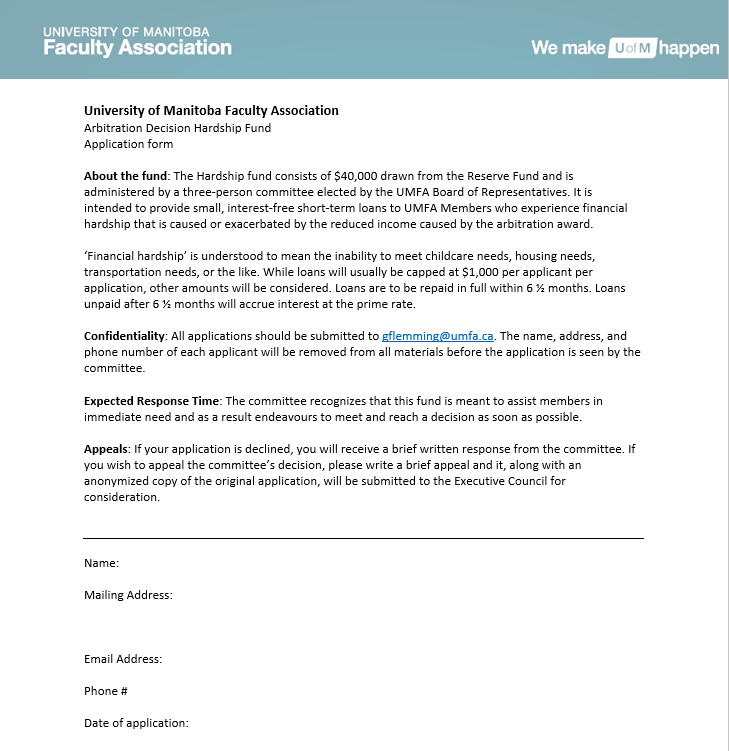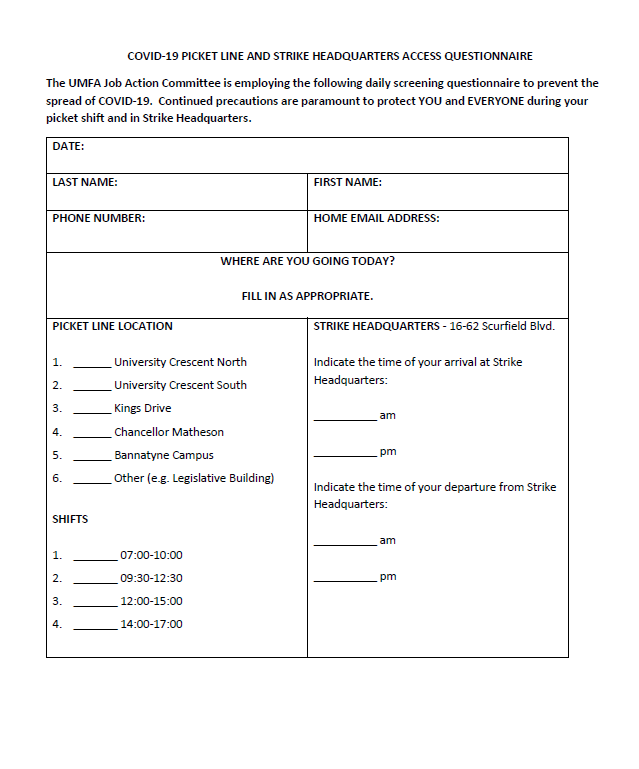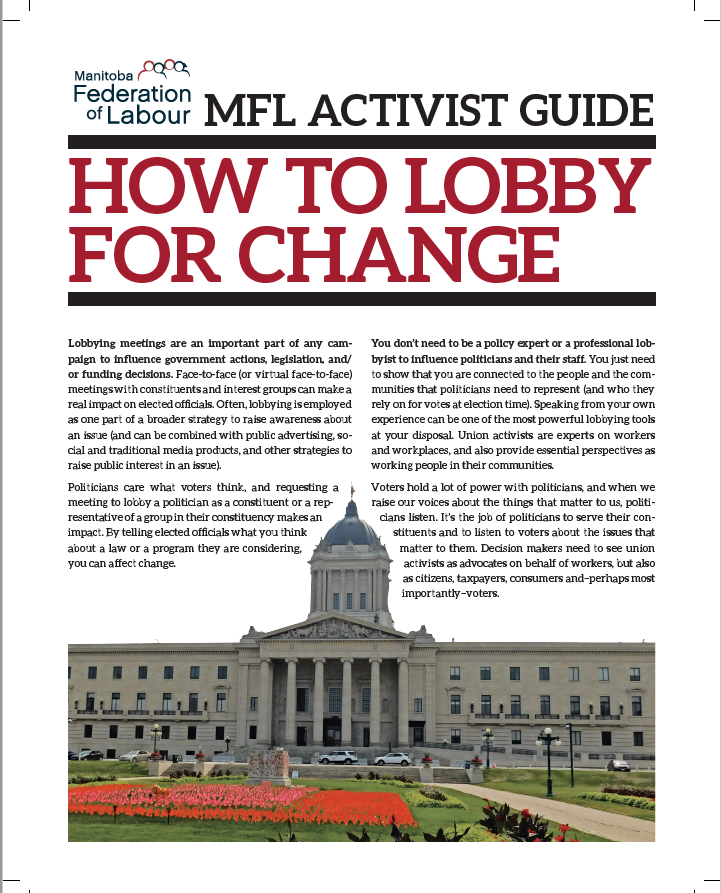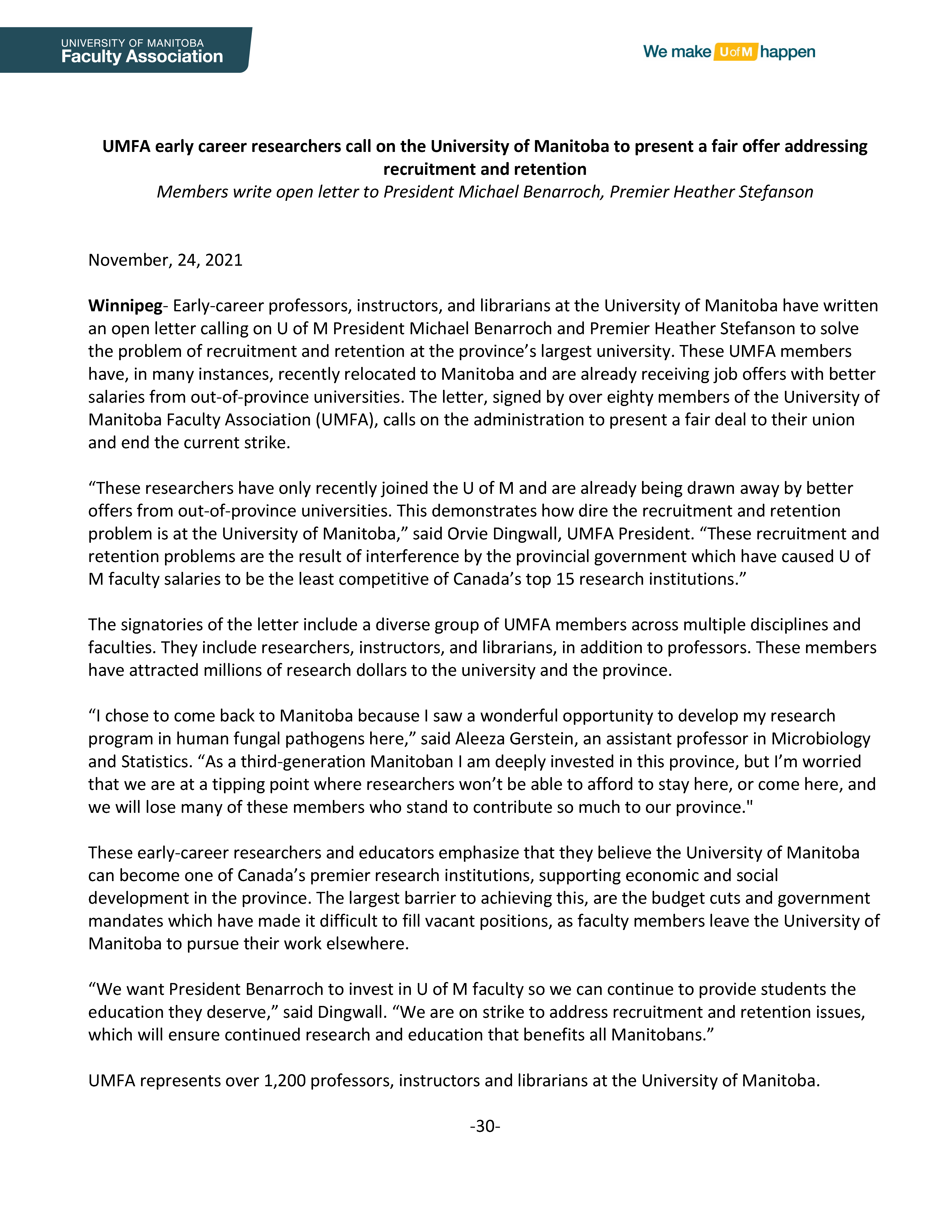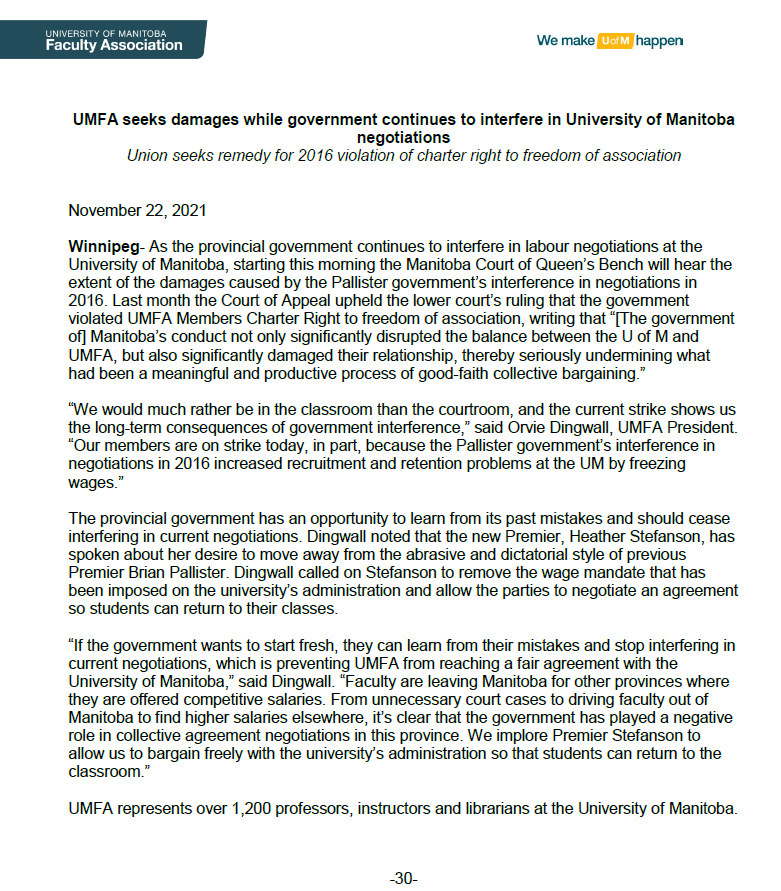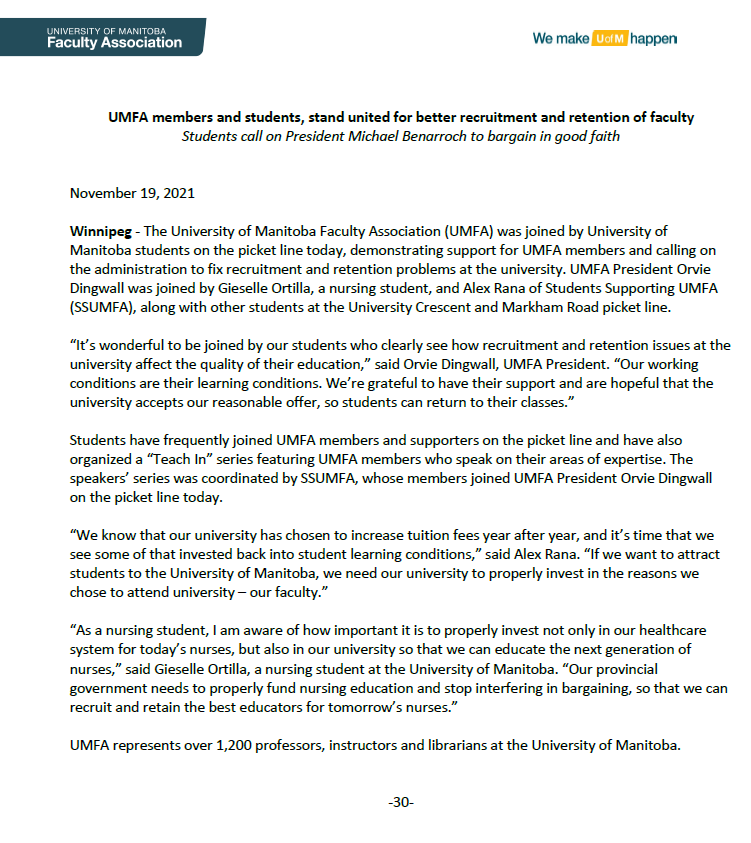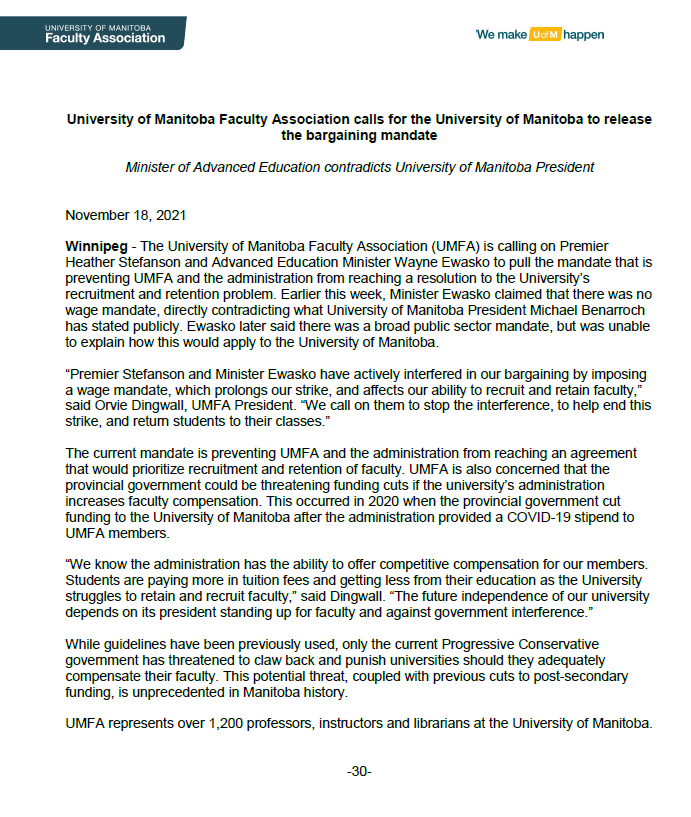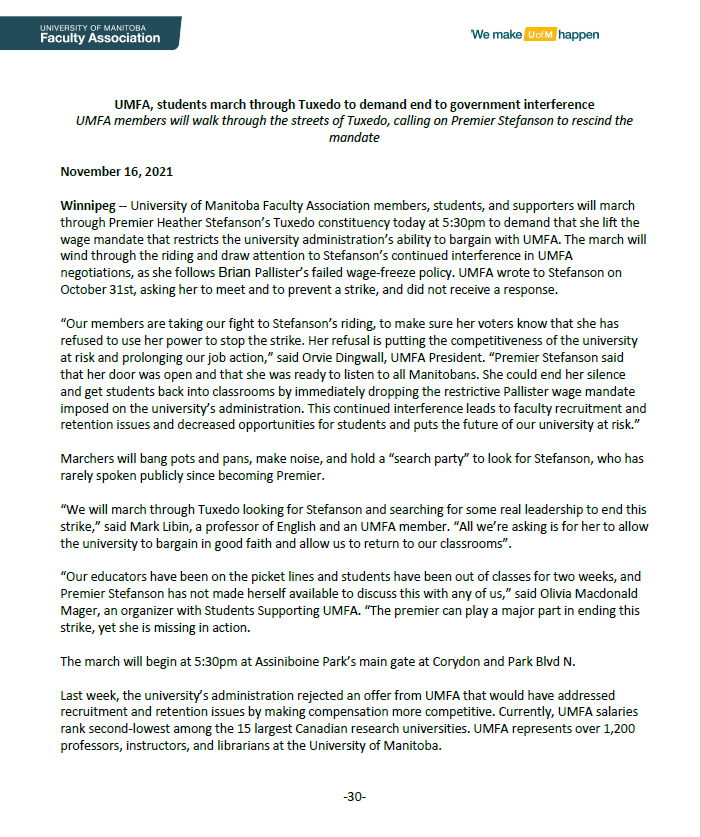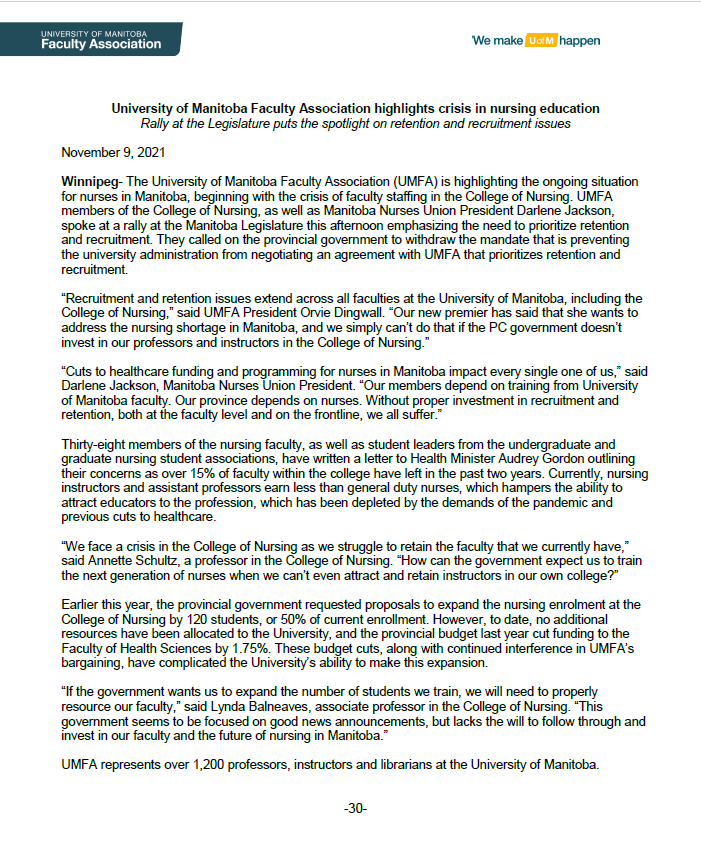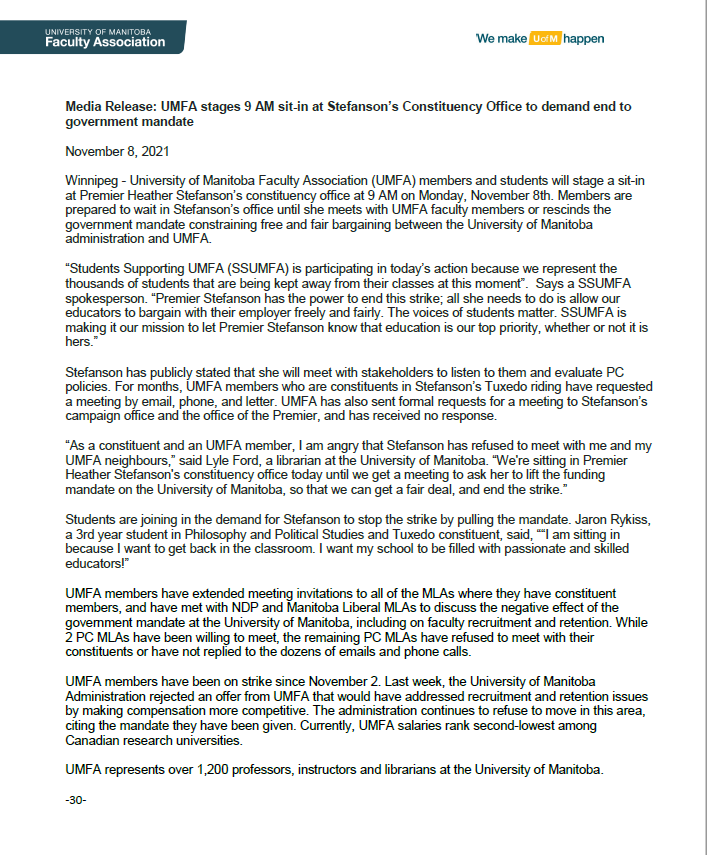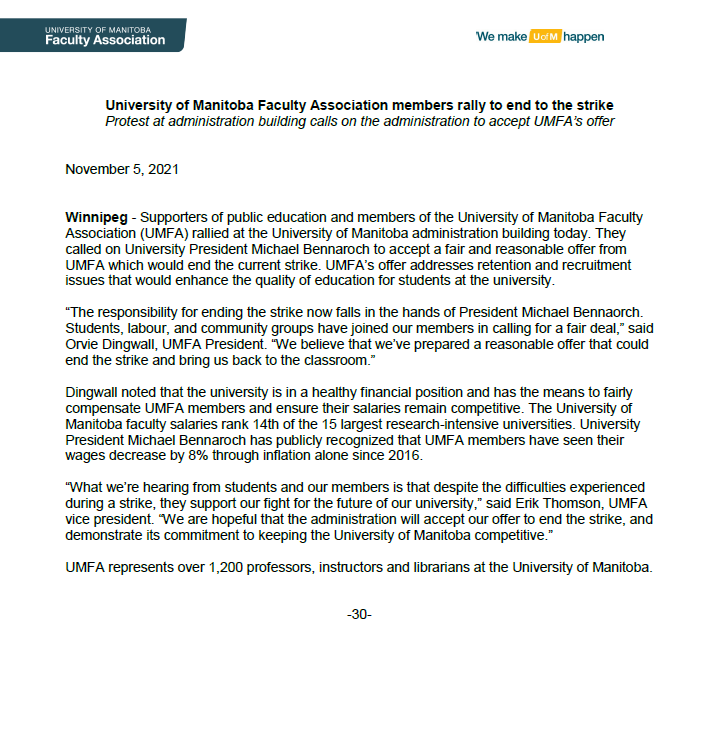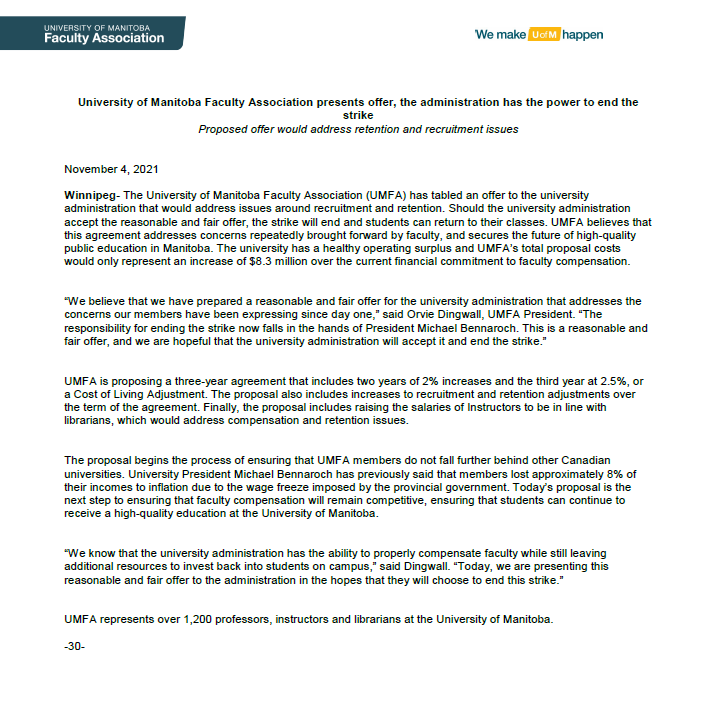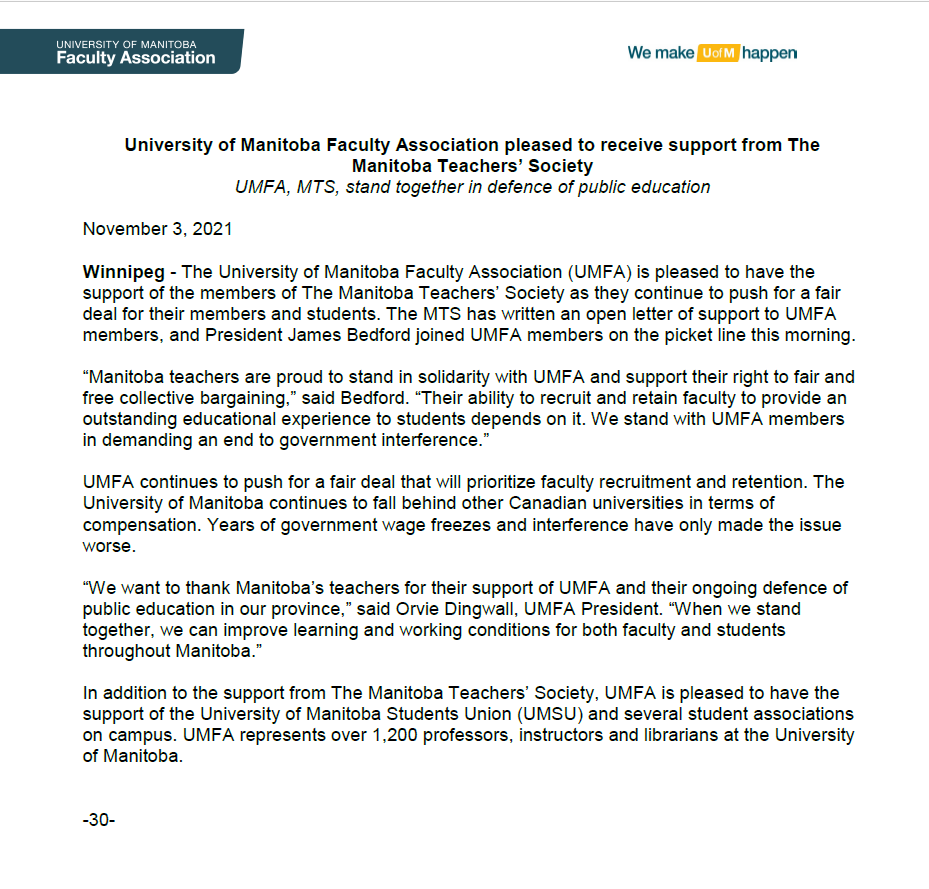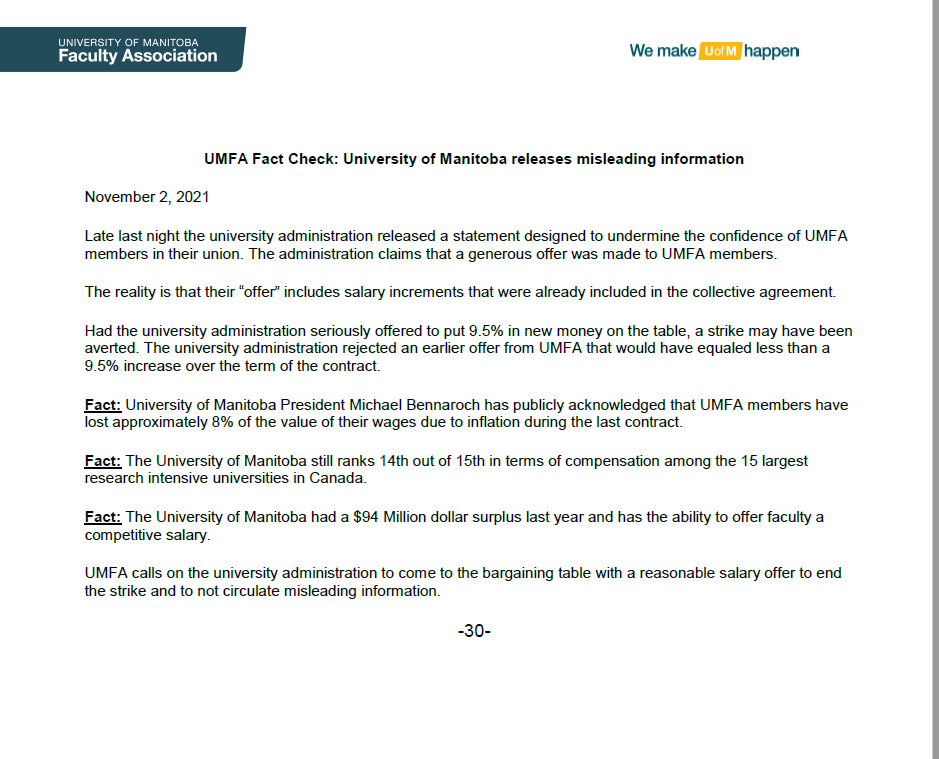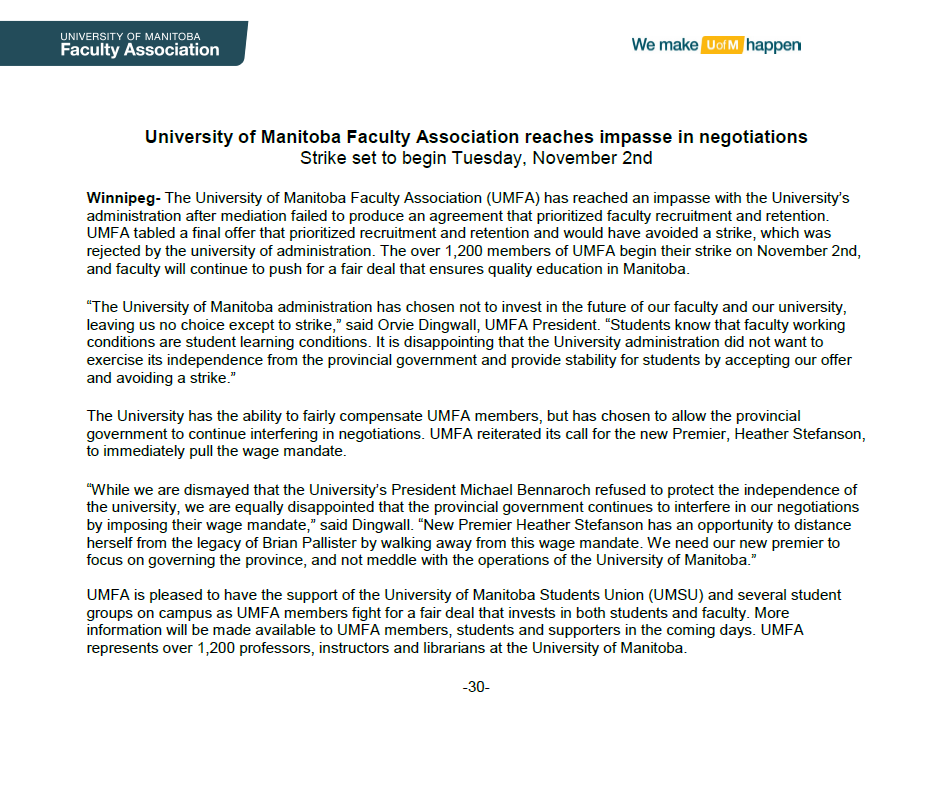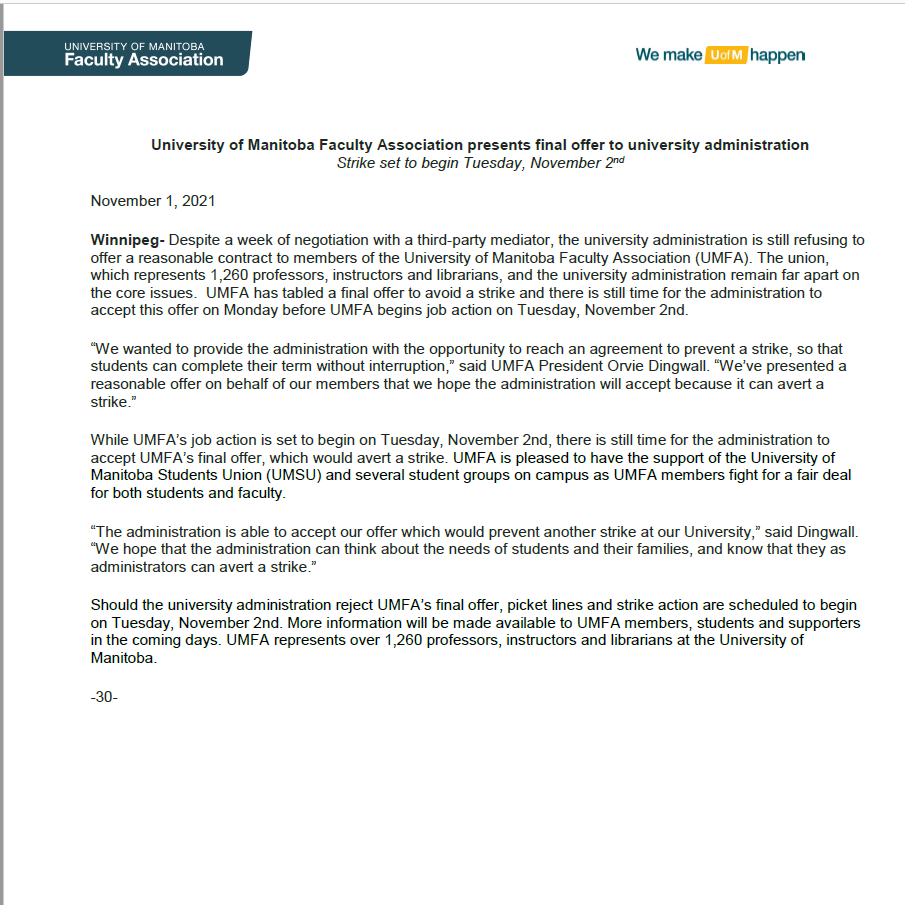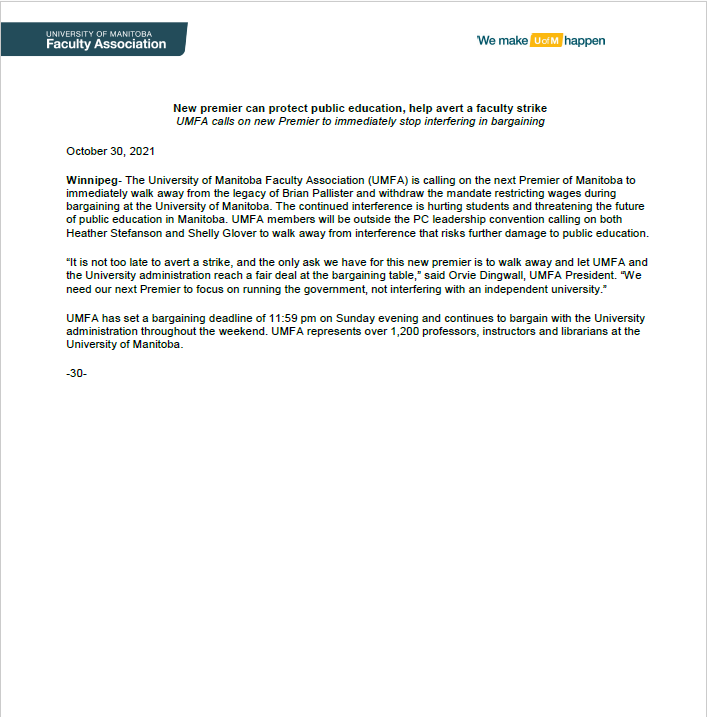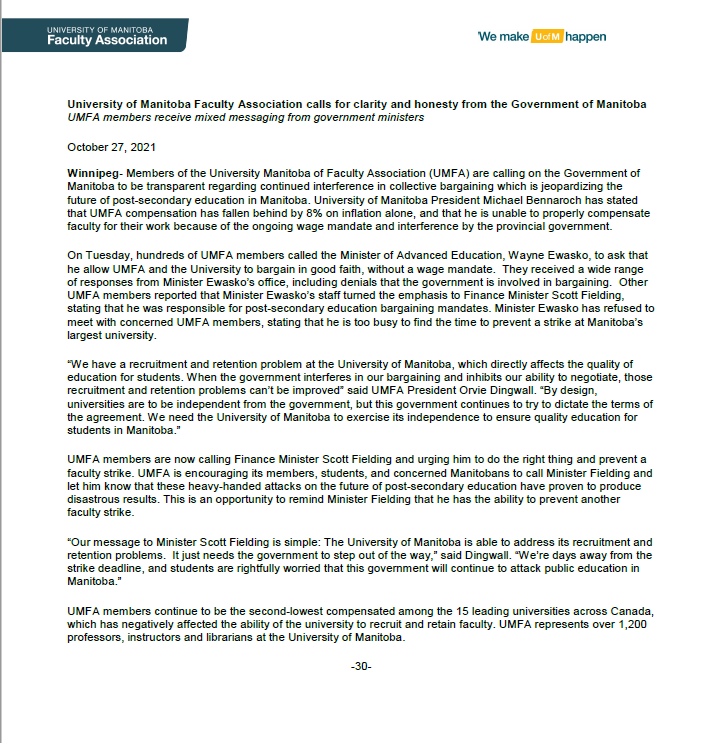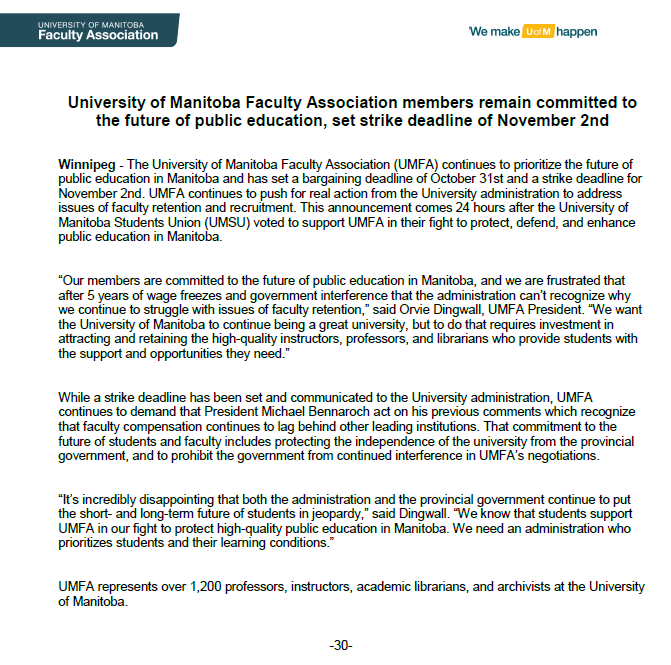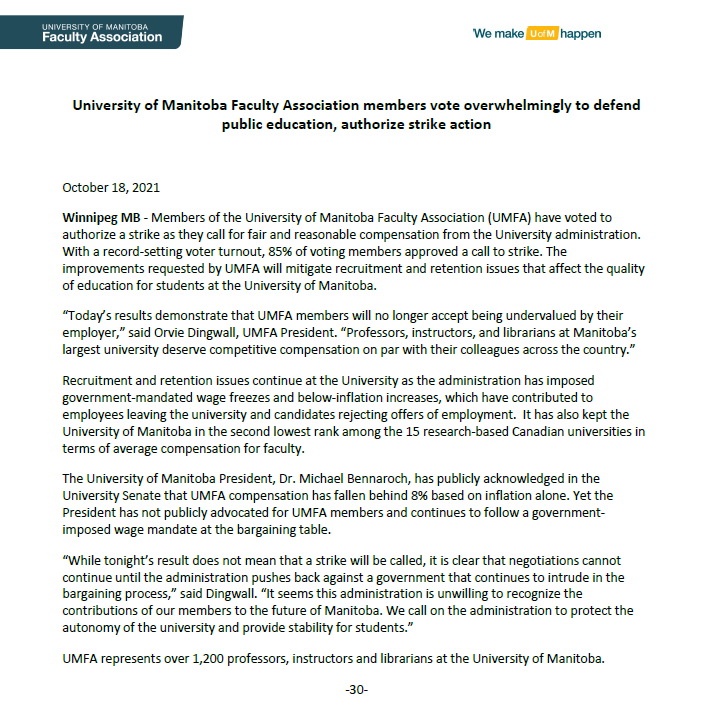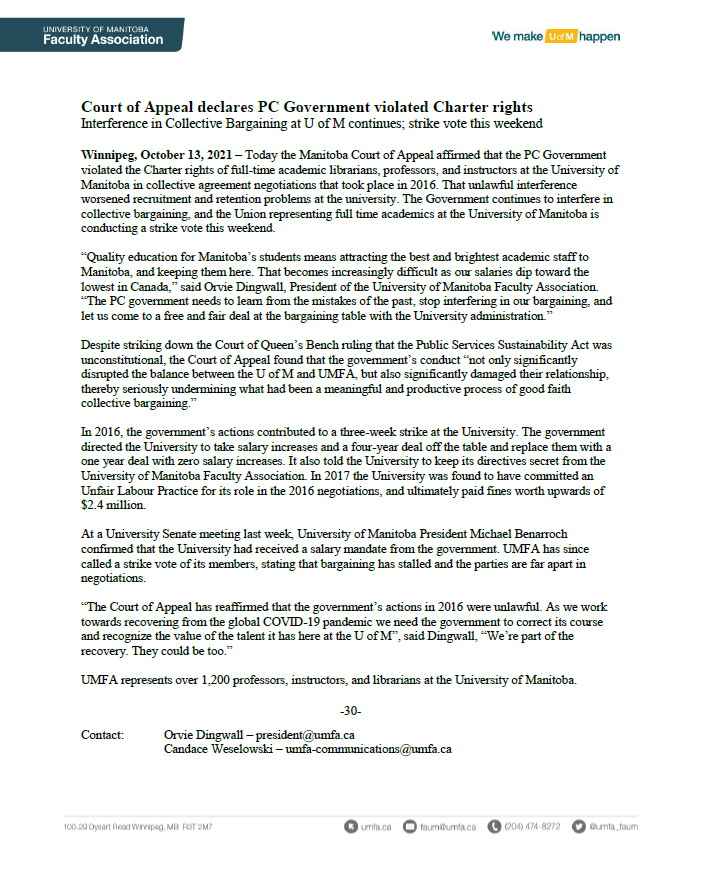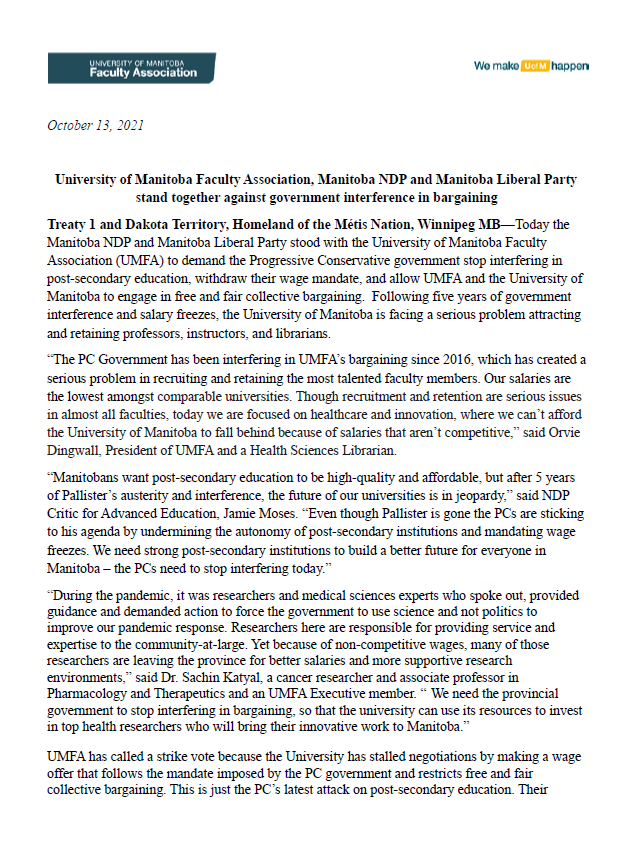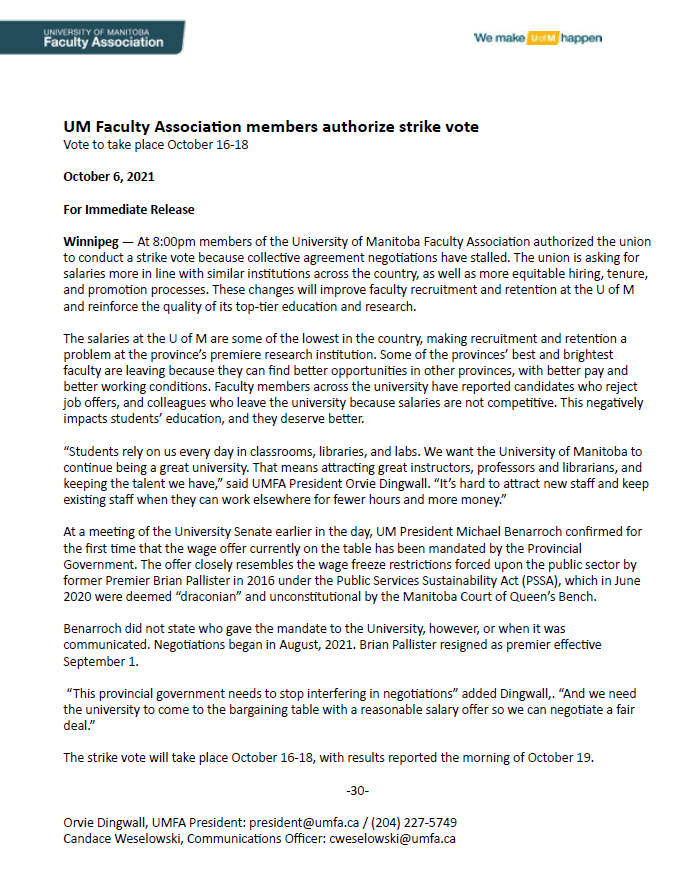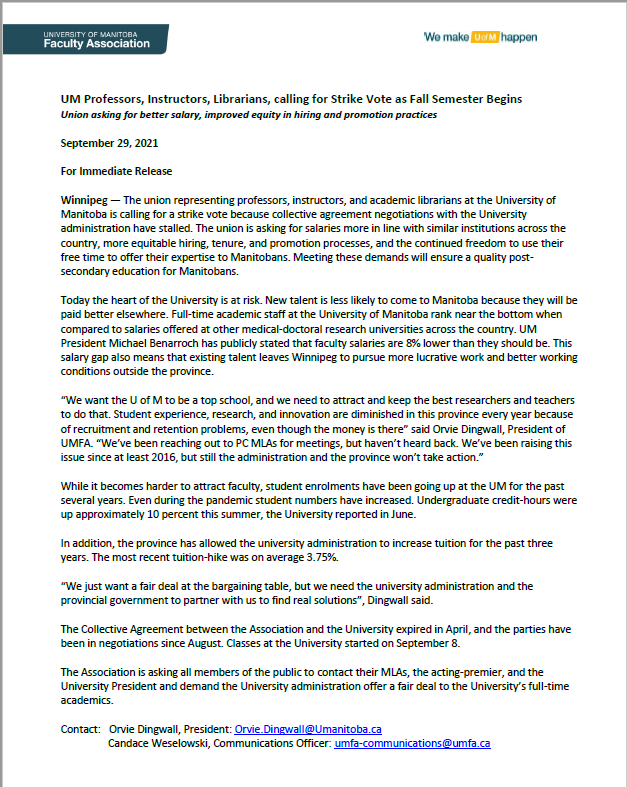Message from UMFA President Mark Hudson and U of M President David Barnard
This message is being sent from Mark Hudson, President, UMFA, and David Barnard, President University of Manitoba to all members of the University of Manitoba community
After one day of productive mediation, the University of Manitoba and the University of Manitoba Faculty Association (UMFA) have agreed to communicate jointly to the University community about a dramatic recent development in our ongoing efforts to negotiate a new collective agreement.
From the University of Manitoba’s perspective: Over the past several days, the Province has made clear to the University that it has established fresh mandate parameters that seek cooperation in achieving a compensation “pause” throughout the public sector. Public bodies, including the University of Manitoba, are being asked to extend existing contracts for an additional year at zero per cent in order to stabilize public sector compensation levels.
We now find ourselves in the unusual circumstance of having a newly articulated Provincial mandate regarding public sector compensation levels that will have a profound impact on the final compensation levels that we will be able to negotiate, despite having already made what we believe to be a fair and reasonable offer on September 13, 2016.
The University of Manitoba is indeed challenged by these circumstances coming at the end of what has been a difficult but advancing series of discussions since March 2016.
From the University of Manitoba Faculty Association’s perspective: This 11th hour action represents illegitimate government interference in a constitutionally-protected process of collective bargaining. Mediation continues, and our focus is to advance our Members’ priorities through that process. The UM is an independent body whose Board must have the autonomy to engage in all aspects of negotiation. The Province has unnecessarily endangered a complex negotiation through this misguided interference, and its action has jeopardized the educational goals of every UM student. UMFA is currently exploring legal options, and continues to focus on negotiating a fair deal for its members.
Bargaining has been presented with an unexpected complication, but both parties are resolved to continue discussions.
Our negotiations comprise many issues of grave importance to valued faculty members and these will be addressed as the mediation process continues this weekend.
Both parties recognize the impacts a strike can have on students and will work diligently to avoid such an outcome prior to the November 1 strike deadline. The University administration and UMFA take our responsibility to the larger University of Manitoba community very seriously. We are united in caring deeply about the University’s mission to create, preserve and apply knowledge contributing to the wellbeing of this province, Canada and the world.
As both parties continue mediation throughout the weekend with a media blackout imposed by the mediator, there will be no further statements by either party.
Bargaining Newsletters
Background Information: Performance Indicators
Click to view Newsletter PDF
Why Do Negotiations Matter?
Click to view Newsletter PDF
University of Manitoba Financial Analysis - Part I: Healthy Finances - July 2016
Click to view Newsletter PDF
University of Manitoba Financial Analysis - Part II: Where's the Money? August 2016
Click to view Newsletter PDF
Financial Health at What Cost? September 2016
Click to view Newsletter PDF
Strike Vote and Bargaining Priorities October 2016
Click to view Newsletter PDF
Financial Health at What Cost? October 2016
Click to view Newsletter PDF
Bargaining Updates
- Update from Strike HQ: November 9 Morning Update - November 9, 2016
- Important Bargaining Update: UMFA Responds to Latest Offer - November 7, 2016
- Strike Update - Sunday, November 6, 2016
- News from the Line - Strike Day 4 Update: November 4, 2016
- Strike day 3 update - November 3, 2016
- Strike day 3 update - November 3, 2016
- Strike day 2 Update - November 2, 2016
- Strike day 1: Message from UMFA President Mark Hudson - November 1, 2016
- Bargaining update #16: UM Administration Fails to Address Members' Main Issues - Strike to Begin Tomorrow - October 31, 2016
- Bargaining update #15: Day 3 Mediation Update #2 - October 30, 2016
- Bargaining update #14: Mediation Update - Day 3 - October 30, 2016
- Bargaining update #13: Mediation Continues Today - October 29, 2016
- Bargaining update #12: Mediation update - October 28, 2016
- Bargaining update #11: Keep the Pressure on - October 26, 2016
- Bargaining update #10: Administration Refuses to Make Real Movement - Strike Deadline Looms - October 24, 2016
- Bargaining update #9: Administration Stalls Again - October 21, 2016
- Bargaining update #8: Executive Council Passes Motion to Set Strike Date - October 19, 2016
- Bargaining update #7: Strike Vote Results - October 13, 2016
- Bargaining update #6: Member Priorities in Bargaining - September 23, 2016
- The results are in! UMFA Members Keep our University Working - September 15, 2016
- Bargaining update #5: Bargaining resumes - August 30, 2016
- Bargaining update #4: Want to Teach in a Different Classroom? Ad Astra & Collective Bargaining - August 5, 2016
- Bargaining update #3: Hiatus - August 4, 2016
- Bargaining update #2: July 7, 2016
- Bargaining update #1: May 30, 2016
Fast Track Bargaining Updates
Fast track update - April 21, 2016
Fast track update - April 13, 2016
Resources for Members
Application Forms
General Job Action Information
Updated as of Oct. 31, 2021
What does it mean to go on strike?
With a bargaining deadline of 11:59 PM on October 31st, UMFA is poised to potentially begin a strike on November 2, 2021. If the university administration will not offer you a fair deal, we must make them uncomfortable enough that they decide to offer one. This means you must impede the function of the university as much as it is safe and ethical to do so.
What do I have to do?
Everyone is required to contribute to job action (3 hours each day, Monday through Friday) in order to receive strike benefits ($200/day which is $1400/week). Strike benefits are tax-free. For most, this will mean joining the picket lines.
Should UMFA be on strike beginning Tuesday November 2nd, striking members will be responsible to:
1. Withdraw your labour from the University of Manitoba. This includes teaching, service to the university, regular job duties (like paperwork or the supervision of employees), and as much peripheral research activity as possible.
It is key to withdraw as much of our labour as possible from the university in order to motivate the administration to come to the bargaining table and make a deal. If a task associated with your work or research is ethically required (for example, it involves a time-sensitive support to a vulnerable community, or animal care) or is time sensitive and does not exert pressure on the University (for example, an experiment or paper deadline required to keep your personal research project viable), please contact the Job Action Committee at This email address is being protected from spambots. You need JavaScript enabled to view it. to arrange for a picket pass.
For details on the agreement the Association has made regarding access to campus during the strike, see below.
2. Participate in assigned picket duties, 3 hours/day, Monday-Friday. Picket duties are designed to connect all of us and to demonstrate our resolve and unity. Attending your assigned picket shift is crucial. Picket duties will be assigned by Monday November 1st, or sooner, as the Job Action Committee is working around the clock to get them out as soon as possible. If you cannot make your assigned picket shift, or require a change in picket duties, please contact your picket captain or the Job Action Committee at This email address is being protected from spambots. You need JavaScript enabled to view it. as soon as possible to determine alternate arrangements.
If you indicated you require a virtual picket assignment, that will be accommodated without question.
Though picket duties are Monday-Friday, your strike benefit of $200/day is for each day of the strike, including weekends. This $1,400/week is tax-free. To be eligible for this strike benefit you must sign in for your picket duties every weekday.
3. Make all teaching materials inaccessible to students, remove them from UM Learn, or close UM Learn course access, prior to the beginning of the strike. Allowing students to continue in their courses as if nothing is happening undermines the strike and fails to put pressure on the university administration to come to the table and make a deal. Details on how to hide your course materials are included below, and in the event of a strike this must be done by the end of day Monday November 1st.
4. Set your university email Out of Office message to indicate you are participating in the strike and will not be answering emails or work-related calls until the satisfactory resolution of bargaining. Our strike is made more effective with every annoyed email and phone call the government and university administration receives about the strike. By highlighting the cause in your away message, you provide more opportunities for those calls to happen. Invite your students to share their displeasure about the strike with the government and the university administration.
5. To join in-person picket lines or enter the off-campus headquarters, you must be fully vaccinated to join picket lines and other in-person activities. You will be required to complete contact tracing forms each day. For those who cannot, or are not comfortable with, in-person activities virtual picket duties are available and include online and phone activities.
Out of Office Message Template:
I am a member of the University of Manitoba Faculty Association and am on legal strike as of Tuesday November 2nd, 2021. I will not be answering emails, working, teaching, or attending meetings outside of union activities until we have received a fair and reasonable contract.
Please contact the following individuals to voice your support for a fair deal for UMFA, an end to government interference in the University of Manitoba, and an end to the strike:
- Minister Scott Fielding 204-945-3952
- Minister Wayne Ewasko 204-945-8480
- University of Manitoba President Michael Benarroch 204-474-9345
- The Office of the Premier of Manitoba 204-945-3714
How to make your teaching materials inaccessible to students in UM Learn:
- From the course home page, click on the Course Admin tab.
- Click on Manage Dates, which might be found in the Site Resources section. This will take you to a page that shows your course dates at the top (don’t touch these) and below that, a chart that lists each piece of course material that you’ve uploaded. Ensure that the tool filter is set to All.
- Beside Bulk Edit Dates - check the box, and then click Bulk Edit Dates.
- Scroll down to End Dates, check the box, and set the visibility deadline to the desired date. Save it.
- To remove this end date, follow the same steps, instead clicking Remove, and then saving.
This will allow you to leave material online but have it accessible only when students are required to access it.
Please note that the bulk edit may not work if:
- You have entries in the Due Date column. You may have to delete these entries before you can bulk edit the materials. Once you make the course material visible again, you can add the due dates back in.
- There is an error with a start date that is already entered in the chart. If you set the start date to “now” when you bulk edit the end date, this should solve the problem.
You can also hide each item of course materials from view individually, by clicking the little eye icon or changing the status of the item to draft.
What if my research would be significantly harmed if I stopped doing it during the strike?
This is your university. We are on strike to put pressure on the administration to come to a fair settlement. That pressure comes from withdrawing from teaching and service duties. UMFA is not on strike against its Members. As a scholar, it’s likely you’ll want to continue pursuing your research, and sometimes research can’t take a hiatus. Mice and bacteria die, crucial relationships need to be attended to, obligations with research partners or participants need to be met.
If you need to come onto campus, striking Members with research activities underway that have time constraints, or that involve laboratory responsibilities will be provided with passes to cross the picket line in order to maintain the viability of laboratories, care for animals, or carry out other duties necessary to prevent the loss of data and assure the resumption of normal research activities after the strike. Where emergency situations arise for Members such as those who are working in Dental Clinics or have Counseling responsibilities, passes will also be provided as necessary. Contact the job action committee via This email address is being protected from spambots. You need JavaScript enabled to view it. if you may require a pass.
Should I advise/communicate with students using personal contact info during a strike?
No. Advising and communicating with students is part of your regular work and should cease for the duration of a strike or lockout.
Can I hold workshops/rehearsals/office hours from home or another location during the strike?
No. Advising and communicating with students is part of your regular work and should cease for the duration of a strike or lockout.
What is the proper etiquette when walking on the picket line? Do we stop cars and people from entering?
Your picket captain will give you directions on etiquette and picketing procedure, and you should follow that direction. At all times, remain professional, courteous and non-confrontational. UMFA Members have the right to walk the picket line, and the public has the right to cross it. Members can try to dissuade people from crossing the picket line by sharing information about why UMFA is on strike and what the issues at hand are. If there are any problems, the picket captain should be notified.
Do I need to withdraw my services from bodies like the U of M Research Ethics Boards, Senate, or any other department or faculty committees in the event of a strike?
Yes, withdrawal of services during a strike means to withdraw all services including participating on committees. However, if Senate meets during a strike it may be important that Senators who are UMFA members participate in Senate meetings where discussions that will affect the operations of the University are discussed.
Will students be protected from reprisal if they refuse to cross the picket line to attend classes run by non-strike members and non-UMFA instructors?
The University Secretary has confirmed that a motion to protect students from reprisal for respecting the picket lines is being prepared for discussion at Senate. Students may be required to keep up with assignments in courses taught by non-UMFA members, even if they are not attending lectures in solidarity with UMFA. This will be updated as soon as this motion has been brought forward.
Can I use campus facilities, like the gym or the library?
As long as you are not working, you can use facilities that are located on campus.
What has UMFA negotiated with the university in terms of access to email, Members on leave, access to research funds, grant submissions, TAs, RAs, etc?
UMFA has negotiated the following terms:
- Access to University of Manitoba email addresses or other online platforms essential to research and/or creative activities will continue.
- No leaves will be interrupted – this includes approved research study leaves (RSL), sick leaves, maternity and parental leaves, and long term disability (LTD). In particular, you will continue to receive maternity/parental leave top-up or disability payments. If the period of leave or disability should expire during the strike, it will be assumed that you are then on strike. At the administration’s insistence and against our objections, Members on RSL will have to declare to the administration that they are continuing their planned leave activities to continue to receive their salary. Members on RSL will need to contact UMFA for next steps if their RSL ends while the strike is ongoing.
- The administration will not impede the progress of grant applications submitted through the University, including but not limited to grant applications made to tri-council agencies.
- Access to funds for research expenses will continue in order to ensure that non-UMFA staff salaries, monthly costs for animal services, and other necessities will continue to be paid. Maintenance, repairs, reordering of supplies and equipment, etc., will also continue.
- The administration will process reimbursement claims for expenses incurred prior to the start of a strike.
- Capital purchases on pre-negotiated terms/quotes associated with research projects can move forward.
The administration has also agreed that it will not impede any other activity which, if left uncompleted, would result in harm to research and/or other projects currently undertaken by an UMFA member.
How will the strike affect my life and health?
How will I pay my mortgage or rent? (Is there a strike benefit?)
Members who are on strike, and who are helping to maintain the strike through some form of duty (picketing, primarily) receive a strike benefit of $200/day, seven days per week, while we are on strike. This benefit is exempt from tax and other deductions, so you will take home $1400 per seven days. Additionally, UMFA has a hardship loan fund for those who may require additional compensation to cover normal living expenses during this time. Contact the UMFA office at This email address is being protected from spambots. You need JavaScript enabled to view it. to inquire.
How will I receive the strike benefit?
By cheque in the mail once a week, upon confirmation that you have participated in picket duties. In special situations, cheques will be available at strike headquarters.
Will my health benefits continue if I’m on strike/locked out?
Yes. UMFA will pay the cost of maintaining all of your regular health benefits. Pension contributions will not continue because the university will not permit UMFA to pay the contributions, and your pensionable service will be reduced by the amount of time that the job action lasts.
If I’m on Maternity Leave, Parental Leave, Sick Leave, or Long Term Disability, will my salary/benefits continue to be paid by the University?
Yes. If you are currently on leave for the above reasons you will continue to be paid and have access to your benefits. You will not be expected to participate in demonstrations or rallies, nor will you be eligible for strike benefits. If you are fully vaccinated, you will be welcomed warmly if you decide to join a rally or an in-person picket line!
If I am on research/study leave, will I be on strike/locked-out if a strike/lockout occurs?
No. UMFA Members are only withdrawing their teaching and service labour, and will continue to be paid by the University while on leave. But you'll always be welcome to show your support on the picket line! Against our objections, the university administration is requiring that members on Research Study Leaves fill out a form indicating they are continuing their leave and will not be participating in the strike.
If I am on research/study leave, should I complete the university’s “Notification of Intention to Continue all Normal Duties” form?
Yes. The University administration is requiring you to complete a “Notification of Intention to Continue all Normal Duties” form in order to continue receiving salary during a strike. In the view of UMFA’s Executive, this should not be necessary. We expressed this with the administration yet they remained insistent. You are continuing a leave you are entitled to and have already begun. You are not strike-breaking. Because the administration is requiring it of you, you must fill out the form to continue to receive your pay and benefits.
Can I be fired for going on strike?
No. This is illegal in Canada.
What measures are in place to ensure the safety of all those participating in picketing?
Pickets should not be a dangerous place. It should be orderly and disciplined. Sometimes, people who are being delayed at a picket will shout abuse or get angry. Picket captains are trained and equipped to deal with any incidents that might occur on the picket lines. They have a phone with a direct dial to police and to strike headquarters. If you maintain an orderly picket under the direction of your picket captain, that will maximize everybody’s safety.
What kind of assistance is available from UMFA in terms of childcare during the strike?
UMFA is not in a position to provide childcare. Please choose your preferred strike duties according to your already-existing childcare arrangements. However, if you are asked to gather outside of the hours of your regular childcare arrangements, UMFA will compensate you for reasonable childcare expenses incurred as a result of your attendance.
If I am on a reduced appointment, do I receive the full strike benefit or half that amount?
For all UMFA Members who participate in strike duties 3 hours/day, Monday-Friday, you will receive the full $200/day and $1400/week if you picket for 5 days in a week.
A medical or familial situation has arisen in my family involving medical appointments or caregiving obligations. Should I just attend to these issues as they arise and participate on the picket line as is possible?
UMFA needs to know that you are participating in strike duties regularly in order to provide strike benefits. If this is proving to be difficult due to unforeseen issues at the time of the strike, please let the job action committee and your picket captain know so we can work out an alternate arrangement.
Will my students who are paid RAs or TAs still be paid during the strike? Will my direct reports continue to be paid?
Research Assistants, Teaching Assistants, and other employees are members of other unions on campus. As such, they are obliged to continue working. They will continue to be paid, and it is the responsibility of the university administration to ensure they are paid.
How would a strike affect UMFA members who coach Bison sports?
UMFA Members with Coaching responsibilities will not teach any coursework or carry out any service responsibilities, e.g. sitting on UM committees, liaison with external parties (e.g. UM rep. on provincial sport associations) but can continue to coach their teams and participate in scheduled conference games. Other activities might have to be considered on an individual basis. Coaches will be expected to get passes to cross picket lines.
Comments, Questions, or Concerns? Contact the Office -- This email address is being protected from spambots. You need JavaScript enabled to view it. / 474.8272
PDF version here.
COVID-19 PICKET LINE AND STRIKE HEADQUARTERS ACCESS QUESTIONNAIRE
Guides
Manitoba Federation of Labour Activist Guide - How to Lobby for Change
Joint Reports - UM/UMFA
Study of Gender-based Salary Differentials at the University of Manitoba (2019)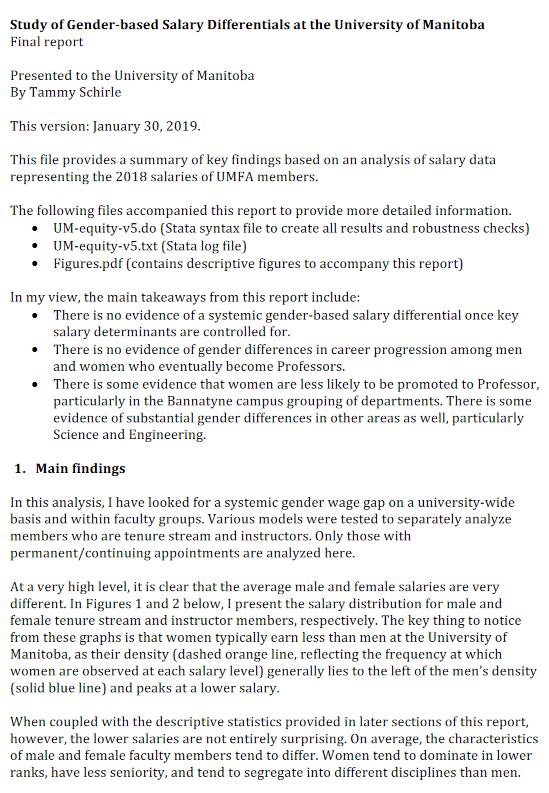
Joint Committee on Metrics Report (2018)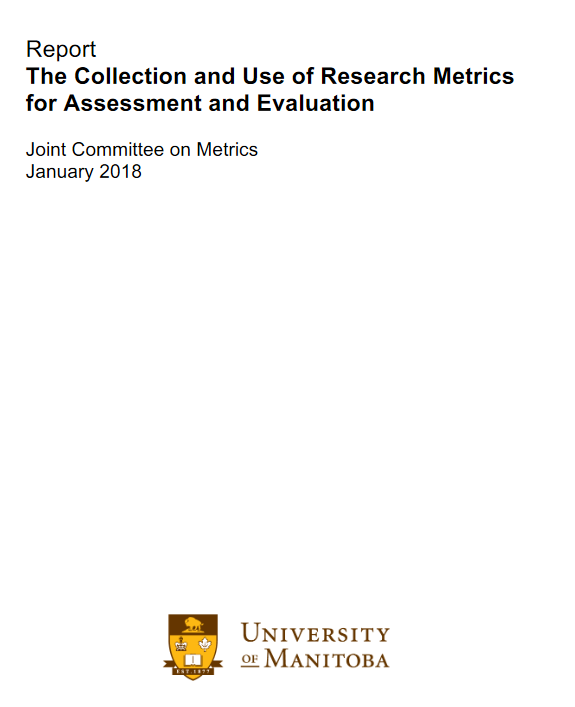
Visuals and graphics
Email signature logo (do not enlarge in your email or it will distort the image)
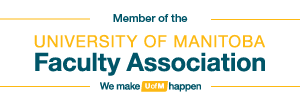
UMFA has made Zoom, Teams, and PowerPoint backgrounds that you can use during your lectures. To save the background images, click on the link below to open the image, then right click to save it.
UMFA "Fair Deal"
UMFA2021 Zoom lightest small text
UMFA2021 Teams Lightest small text

"We Make U of M Happen" backgrounds

UMFA Press Releases
2021 Negotiations
UMFA continues bargaining with university administration (Nov. 26, 2021)

UMFA early career researchers call on the University of Manitoba to present a fair offer addressing recruitment and retention (Nov. 24, 2021)
UMFA seeks damages while government continues to interfere in University of Manitoba negotiations (Nov. 22, 2021)
UMFA members and students, stand united for better recruitment and retention of faculty (Nov. 19, 2021)
University of Manitoba Faculty Association calls for the University of Manitoba to release the bargaining mandate (Nov. 18, 2021)
UMFA, students march through Tuxedo to demand end to government interference (Nov. 16, 2021)
University of Manitoba Faculty Association highlights crisis in nursing education (Nov. 9, 2021)
UMFA stages 9 AM sit-in at Stefanson’s Constituency Office to demand end to government mandate (Nov. 8, 2021)
University of Manitoba Faculty Association members rally to end to the strike (Nov. 5, 2021)
University of Manitoba Faculty Association presents offer, the administration has the power to end the strike (Nov. 4, 2021)
University of Manitoba Faculty Association pleased to receive support from The Manitoba Teachers’ Society (Nov. 3, 2021)
UMFA Fact Check: University of Manitoba releases misleading information (Nov. 2, 2021)
University of Manitoba Faculty Association reaches impasse in negotiations (Nov. 1, 2021)
University of Manitoba Faculty Association presents final offer to university administration (Nov. 1, 2021)
Negotiation deadline nears, UMFA continues to push for a fair deal for students and faculty (Oct. 31, 2021)
New premier can protect public education, help avert a faculty strike (Oct. 30, 2021)
University of Manitoba Faculty Association calls on the PC Government to stop interfering in collective bargaining (Oct. 29, 2021)
University of Manitoba Faculty Association calls for clarity and honesty from the Government of Manitoba (Oct. 27, 2021)
University of Manitoba Faculty Association members remain committed to the future of public education, set strike deadline of November 2nd (Oct. 22, 2021)
Court of Appeal Declares PC Government Violated Charter Rights (Oct. 13, 2021)
University of Manitoba Faculty Association, Manitoba NDP and Manitoba Liberal Party stand together against government interference in bargaining (Oct. 13, 2021)
UM Faculty Association members authorize strike vote (Oct. 6, 2021)
UM Professors, Instructors, Librarians, calling for Strike Vote as Fall Semester Begins (Sept. 29, 2021)
UMFA Letter to Premier Kelvin Goertzen
September 20, 2021
May 12, 2021 - UMFA Bargaining Update #1
UMFA is once again entering a bargaining round, attempting to negotiate a contract with an employer hamstrung by a hostile government. Like other public sector unions subject to the Public Sector Sustainability Act (PSSA), we find ourselves with deflated wages that will not see movement without sustained, intense pressure on the provincial government itself, in addition to all the things we have to do to show the University administration that we’re serious about the changes we need to see at the U of M.
Who is the barrier to achieving a salary increase?
The University President has explicitly said in the University Senate that UMFA salaries are 8% too low, but also said the government has not given a mandate to the University to provide salary increases.1
The government’s commitment to this position -- which it’s held since at least 2016 -- was confirmed by its reaction to the COVID stipend negotiated in November 2020: a dollar amount roughly equal to the total cost of the UMFA COVID stipend was subsequently removed from monies allocated to the UM by the government through the “Transition Support Fund”. That fund was itself taken from the University grant shortly after the pandemic hit, then (partially) returned after being earmarked for costs associated with the pandemic, online teaching, and “labour market alignment”.
This is to say that both the administration and the government are the barriers preventing improvements to our salaries. The government is intent on implementing its plans for the “performance based funding” of PSE, and the University administration fears the cuts the government will impose if it agrees to increase our salaries.
Who in the public sector has received wage increases in the last 4 years?
Manitoba Hydro workers, represented by the International Brotherhood of Electrical Workers (IBEW) Local 2034, have been asking for salary raises for several years. They, too, have been subjected to the PSSA. Things came to a head this March, when the IBEW decided it had to set up picket lines to make gains at the bargaining table. Their employer has continued to refuse to deviate from the government’s mandate on wages, however -- Hydro workers are still on strike.
The only salary increases provided to workers subject to the PSSA in the last four years have come through legal access to arbitration, or through doors opened by previous successful arbitrations. This includes unions that had the Labour Board write their contracts after lengthy strikes (The Winnipeg School Division Bus Drivers) and branches of the Manitoba Teachers’ Society that have legally-mandated access to arbitration to resolve collective bargaining disputes. While arbitrated settlements at two School Boards induced other Boards to make salary offers to their teachers, the Manitoba Government Employees Union (MGEU), which also has legally-mandated access to arbitration, had to fight in the courts for almost two years to have that access granted. This was because the government was unlawfully blocking their progress.
In 2016 UMFA proposed arbitration, but the administration refused because the Government wouldn’t give them a mandate to seek a neutral third-party’s binding decision on salary. A similar proposal was rebuffed by the administration in 2020, for similar reasons.
What about all the other improvements that I want to see at the U of M?
This round of bargaining is about the Collective Agreement as a whole. The bargaining survey will be coming to your inbox soon, and constituency meetings have already started. The Collective Agreement Committee will combine all it learns from the survey and these meetings with all the grievance work that’s been done over the past three and more years to work up bargaining proposals. Those proposals will be presented to everyone for debate and a vote at a Special General Meeting to be called for early this summer.
What about the PSSA? Where does UMFA fit in the context of other public sector unions?
In 2017 UMFA joined the Partnership to Defend Public Services (PDPS) to launch a legal challenge of the Public Services Sustainability Act (PSSA). As university workers aren’t technically public servants (the U of M is autonomous from the government, and about half of the operating budget comes from non-governmental sources), the government had to specifically target U of M employees in its austerity plans. This was true of others, too. The PDPS is for this reason composed of many union locals, large and small -- some no bigger than 3 people (IATSE Local 63 represents stagehands at Centennial Concert Hall), and others representing thousands of workers (the Manitoba Teachers’ Society has about 15,000 members).
With our pooled resources the PDPS won its constitutional challenge to the PSSA at Manitoba Court of Queen’s Bench, in a ruling that characterized the legislation as “draconian.” Justice McKelvey, in her ruling, said:
“The PSSA has left no room for a meaningful collective bargaining process on issues of crucial importance to union memberships. There is no ability to promote representations and have them considered on a good faith basis. The right to meaningfully associate in pursuit of a fundamental and important workplace goal has been denied.”
However, the provincial government is appealing that ruling and arguments from both sides will be heard this summer. The results of the appeal process may not be available for months, and even then the government might be able to appeal to a higher court, extending our wait-time even longer -- potentially for years.
In the meantime, the government’s treatment of Manitoba’s teachers, the IBEW, the MGEU, and other public sector unions suggests that they have little intention of changing their approach to collective bargaining in the public sector.
What are we doing to overcome these barriers?
As in past rounds of bargaining, many of the gains made at the table require a lot of organizing, including preparations for job action. This year we have to prepare on two fronts -- for the work we have to do with the employer at the bargaining table, and for direct and sustained pressure on the provincial government itself.
To begin this work, we have joined together with other provincial faculty associations via the Manitoba Organization of Faculty Associations (MOFA) and have started work on a province-wide political campaign supporting higher education.
We have begun working to prepare every one of our colleagues to meet with MLAs and apply pressure to individual members of the government and Board of Governors. This will unfold over the next few months.
We will also be providing members with opportunities to educate themselves, so that they will be able to respond to public inquiries, students, the over-the-fence conversations with neighbours, etc.
What can we do right now?
Make time for a constituency meeting. The Bargaining Team (BT) is asking UMFA Board Representatives to call constituency meetings to talk about next steps. When your rep calls a meeting, make every effort to attend. If you don’t have a rep, contact fThis email address is being protected from spambots. You need JavaScript enabled to view it. and UMFA staff will help organize a meeting in your unit.
Fill out the bargaining survey. The Collective Agreement Committee(CAC) has recently approved the updated bargaining survey. It should be in your inbox starting in mid-May. Filling it out is important -- it’ll help the CAC develop bargaining proposals.
Come to the Annual General Meeting. The AGM has been rescheduled for May 25 @ 2pm and will be held online. At that meeting there will be discussions of bargaining strategy, organizing strategies, and more.
Join the Organizing & Communications Committee. Contact committee co-chairs Ruby Warren (This email address is being protected from spambots. You need JavaScript enabled to view it.) and Alison Calder (This email address is being protected from spambots. You need JavaScript enabled to view it.) to join organizing and communications efforts. Meetings are held weekly via zoom, Tuesdays at 10 AM CDT.
Get Involved with MOFA. MOFA has a number of committees that need help. You can view information here: http://mofa-fapum.mb.ca/issues/call-for-nominations-for-mofa-committees/ and volunteer by emailing This email address is being protected from spambots. You need JavaScript enabled to view it..
Questions, Comments, or Concerns? Contact the UMFA Office -- This email address is being protected from spambots. You need JavaScript enabled to view it. / 204.474.8272
- “The current situation, which had seen salaries negatively impacted by inflation over the last five years, had been created over a period of time and had been accelerated over the last number of years. President Benarroch said he requested flexibility from the Minister of Finance in response to the Province’s mandate, but appeals to the Province were not successful.” See page 5 here: https://umanitoba.ca/governance/sites/governance/files/2021-01/2020_12_02_Senate%20Minutes.pdf
A Brief on Process
As we continue our preparations for bargaining 2021, here’s a refresher on how the bargaining process works.
Typically, the process begins as soon as a Collective Agreement (CA) is signed: UMFA Staff and Grievance Officers keep track of various issues that arise as the new Agreement is put to use. These issues, along with those raised at constituency meetings, are discussed by the Collective Agreement Committee (CAC). The CAC combines all this information with data gathered through a bargaining survey to create bargaining proposals. Those proposals are then debated by the Board of Representatives, which recommends the proposals to Members, who further debate them at a General Meeting.
With proposals discussed and approved, the Bargaining Team then presents them to the Employer. The Employer also presents their proposals. As negotiations unfold, the Bargaining Team (BT) reports back to the CAC, which debates possible changes to proposals and gives the BT direction on what to communicate to the Employer.
Depending on what happens at the bargaining table, the Executive organizes further constituency meetings, General Meetings, a strike vote, and marches, rallies, and other actions that support the Bargaining Team in their efforts. Once a tentative agreement is reached, the Executive also organizes a ratification vote. If Members think the deal is acceptable, a ‘yes’ vote turns the tentative deal into a new Collective Agreement.
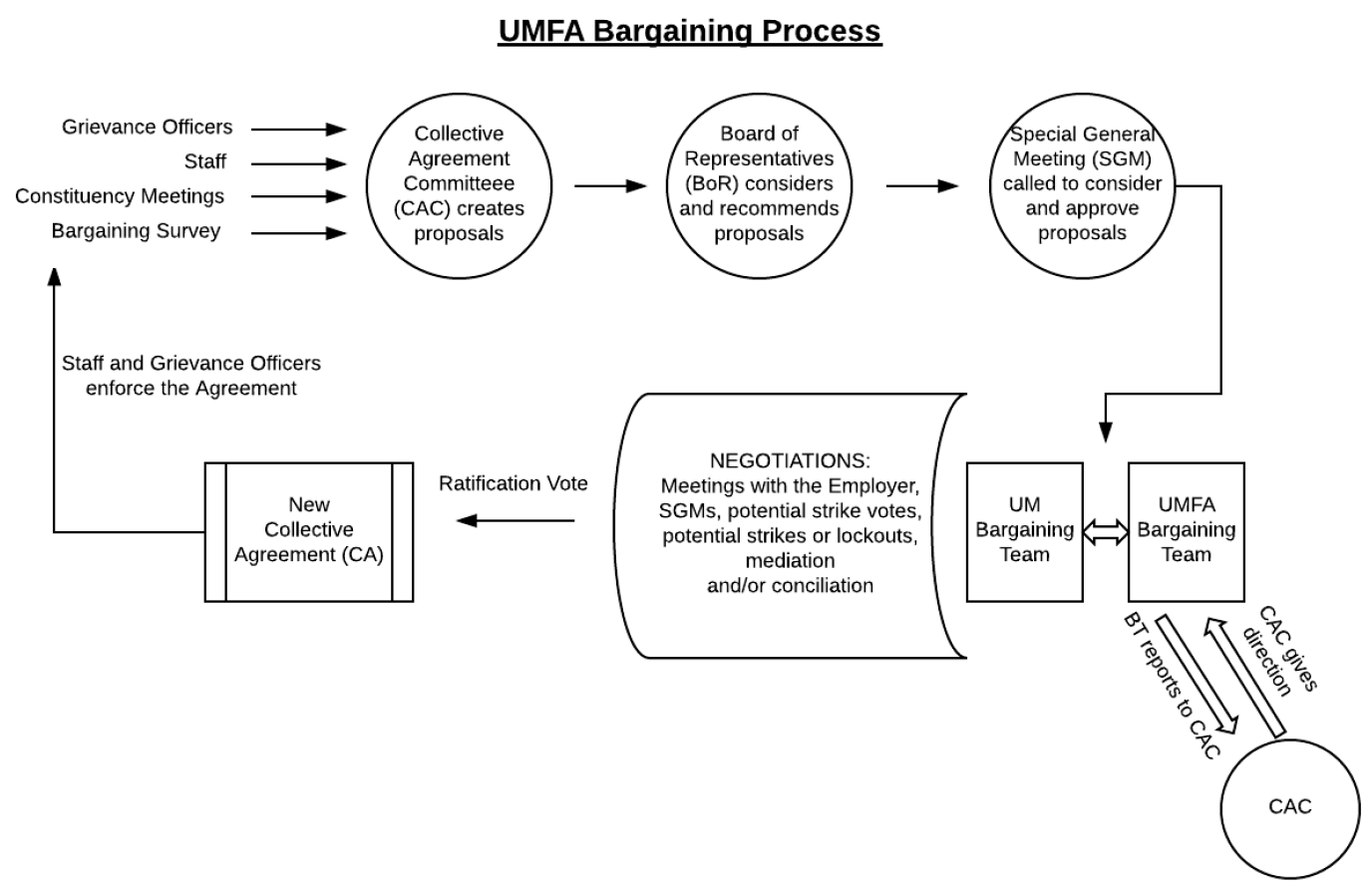
Who Runs the Process?
Bargaining is nothing if not a collective effort. The Bargaining Team (BT) is one of the most visible bodies that partakes in the bargaining process, and is made up of a Chief Negotiator, a number of Members (five this time), each appointed by UMFA’s Board of Representatives. UMFA’s legal staff are also on the BT. The Bargaining Team presents proposals to the Employer and reports to the Collective Agreement Committee on the day-to-day goings-on of bargaining.
While the Collective Agreement Committee (CAC) isn’t as visible as the Executive Council or the Bargaining Team, it plays an important role in the process: Composed of the Executive, the BT, and other UMFA Members appointed by the Board of Representatives, it solicits information from Members, formulates proposals, and develops bargaining strategy. Staff’s expertise and advice are also sought. The Bargaining Team reports back to the CAC regularly during bargaining, and the CAC modifies proposals and strategy as negotiations develop.
During, and even before, bargaining, The Executive Council (Exec) is responsible for developing timelines and ensuring that they’re met, preparing and releasing communications to the Membership and the media (with the help of staff and the Communications Committee), liaising with other unions and the labour movement, and anything else that needs to be done. It’s composed of a President and Vice President elected by the UMFA Membership, the immediate Past President, and five to seven Members appointed by the Board of Reps on the recommendation of the President.
UMFA’s Board of Representatives (the Board, or BoR) is made up of elected representatives from all over the UM. They are responsible for organizing constituency meetings and communicating with their colleagues about bargaining and sharing that information with the Board and the Executive. Board reps are an important link between the BT, Exec, the CAC, and the Membership as a whole, and have a hand in mobilization, among other things.
However, the highest decision making body at UMFA is a General Meeting, constituted when all Members of UMFA are called to discuss specific topics. In the context of collective bargaining, Special General Meetings (SGMs) are called to discuss proposals, overall strategy, and strike votes. It’s also at a Special General Meeting that a tentative deal is discussed, and a ratification vote taken.
Together, these various bodies make the bargaining process what it is: a dialogue between Members about what the workplace should look like and how to make it a reality.
We Make U of M Happen!

